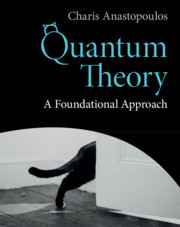Description
Quantum Theory
A Foundational Approach
Author: Anastopoulos Charis
The first graduate textbook to combine wide-ranging applications of quantum theory with an in-depth presentation of foundations.
Language: English
Subject for Quantum Theory:
Approximative price 71.34 €
In Print (Delivery period: 14 days).
Add to cart
Publication date: 08-2023
650 p. · 20.3x25.4 cm · Hardback
650 p. · 20.3x25.4 cm · Hardback
Description
/li>Contents
/li>Biography
/li>
The ideal text for a two-semester graduate course on quantum mechanics. Fresh, comprehensive, and clear, it strikes the optimal balance between covering traditional material and exploring contemporary topics. Focusing on the probabilistic structure of quantum mechanics and the central role of symmetries to unify principles, this textbook guides readers through the logical development of the theory. Students will also learn about the more exciting and controversial aspects of quantum theory, with discussions on past interpretations and the current debates on cutting-edge concepts such as quantum information and entanglement, open quantum systems, and quantum measurement theory. The book has two types of content: Type A material is more elementary and is fully self-contained, functioning like a separate book within the book, while Type B content is at the level of a graduate course. Requiring minimal physics background, this textbook is appropriate for mathematics and engineering students, in addition to physicists. Introducing cutting-edge topics in the field, the book features about 150 concept-checking questions, 300 homework problems and a solutions manual.
Preface; Acknowledgements; Important Information; How to Use This Book; Conventions; Part I. Introduction: 1. The classical world; 2. The birth of quantum theory; Part II. The Principles of Quantum Theory: 3. Hilbert spaces and the superposition principle; 4. Operators: I. General theory; 5. Operators: II. Applications; 6. Quantum probabilities; 7. Time evolution; 8. Quantum state reduction; 9. Composite quantum systems and entanglement; 10. Quantum-classical correspondence; Part III. Elementary Systems and Their Symmetries: 11. Symmetries I: Rotations; 12. Symmetries: II Group theory in quantum mechanics; 13. Particles in three dimensions; 14. Particles with spin; 15. Particle statistics and field-particle duality; 16. Relativistic systems; Part IV. Techniques: 17. Energy spectra and the structure of composite systems; 18. Transitions and decays; 19. Scattering theory; 20. Open quantum systems; Part V. Quantum Foundations: 21. Quantum measurements; 22. Interpretations and challenges; Appendix A Useful formulas; Appendix B Special functions; Appendix C Elements of group theory; References.
Charis Anastopoulos is an associate professor in the department of physics at the University of Patras, Greece. He holds a Ph.D. from Imperial College, London and has worked in various academic positions at the universities of Barcelona, Maryland, and Utrecht. His research focuses on quantum foundations, quantum information and general relativity. He is also the author of Particle or Wave: The Evolution of the Concept of Matter in Modern Physics (Princeton University Press, 2008).
© 2024 LAVOISIER S.A.S.




